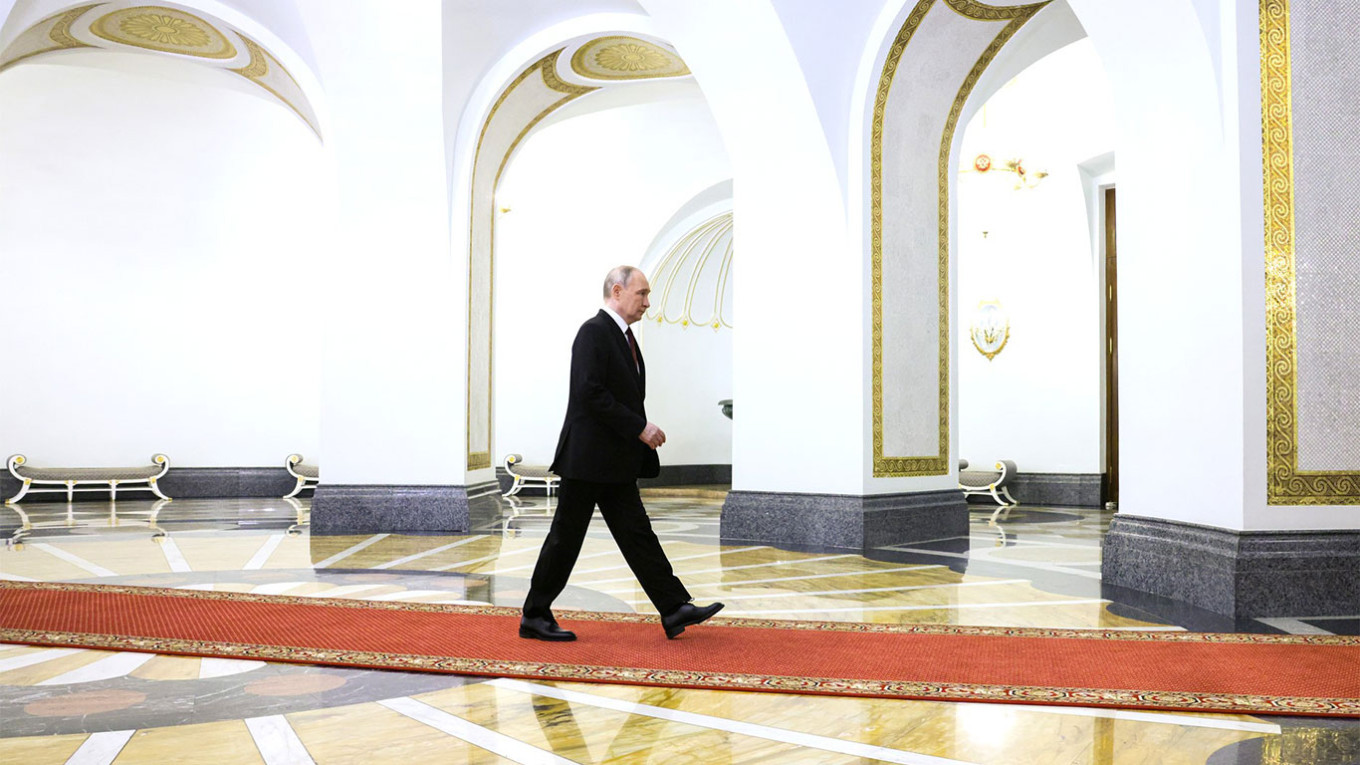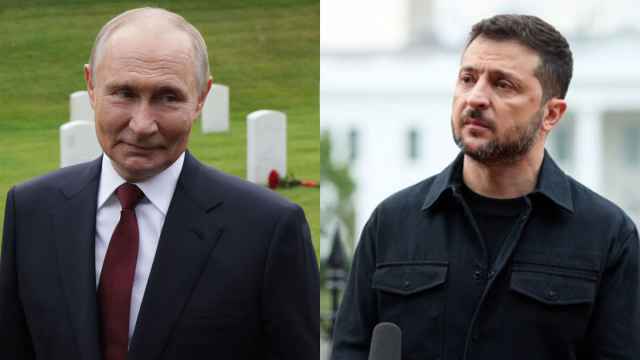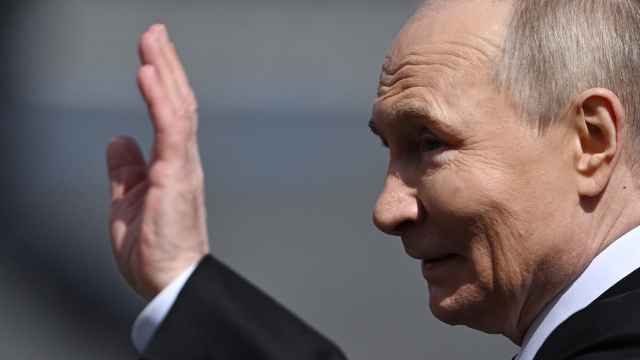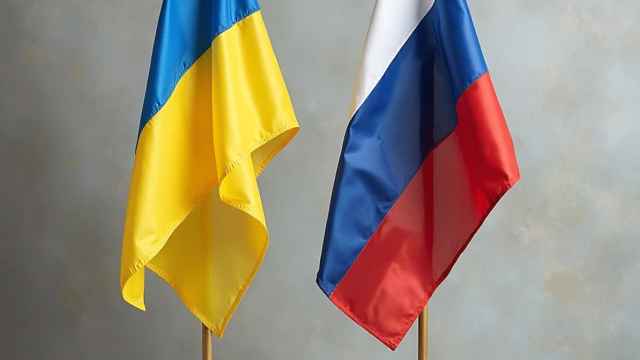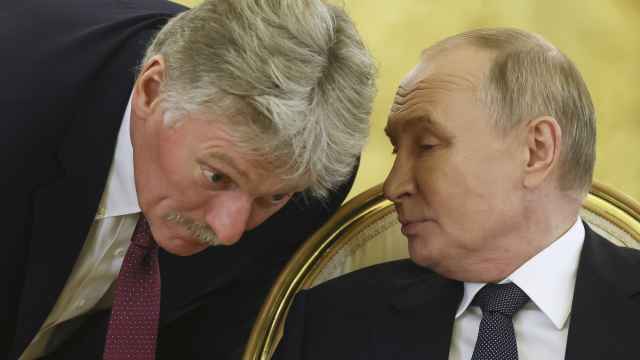President Vladimir Putin never planned to accept Ukrainian counterpart Volodymyr Zelensky’s offer to meet one-on-one in Istanbul, sources in the Russian government and the Foreign Ministry and people close to the Kremlin have told The Moscow Times.
The fact that the Kremlin kept Putin’s travel plans shrouded in secrecy until the night before the first direct contact between Russian and Ukrainian delegations in three years underscores Moscow’s reluctance.
Although sources said Putin does not see Zelensky as his equal and will only agree to meet him in the event of his "public capitulation,” he could not refuse the challenge outright because of U.S. President Donald Trump’s calls for the Russian leader to engage with his opponent.
All of The Moscow Times’ sources spoke on condition of anonymity due to the sensitivity of the matter.
Why the Kremlin is keeping Putin’s plans secret
Zelensky threw down the gauntlet to Putin on Sunday, hours after the Russian leader ignored Ukraine’s Western-backed call for a 30-day ceasefire and instead proposed renewing direct talks with Kyiv in Istanbul on Thursday.
By Wednesday, Moscow had still not confirmed who would represent Russia at the negotiating table. It finally confirmed that it would send a delegation headed by Kremlin aide Vladimir Medinsky in a directive published late Wednesday.
This silence was a deliberate tactic designed to keep Kyiv and its allies on edge and allow for a last-minute change of plans, former Russian diplomat Boris Bondarev told The Moscow Times.
Russian diplomacy largely follows the same protocols it did in the Soviet era, with all high-level talks meticulously prepared in advance.
As a result, spontaneous negotiations on the opponent’s terms — especially when Russia should hold the upper hand — are out of the question, a government official, a current diplomat and a Kremlin insider told The Moscow Times.
“This is not how we do things. First, appointed negotiators do all the groundwork and prepare the documents. Only then does the president step in to discuss terms agreed in advance,” said one source.
“Our leader doesn’t like being pressured. That’s a well-known fact,” added a former senior Kremlin official.
Moreover, Moscow does not recognize Zelensky as a legitimate negotiating partner.
Russian propaganda and Putin himself have declared Zelensky to be illegitimate, meaning Moscow can only sign a peace deal with a new Ukrainian president or with the leadership of Ukraine’s parliament.
Russia has repeatedly tried to discredit the Ukrainian leader because of Zelensky’s defiance in the face of Russia’s invasion, which is a particular irritant for Moscow, as The Moscow Times has previously reported.
While Zelensky’s term technically expired in 2024, Ukraine cannot hold presidential elections under martial law, which it imposed due to Russia’s full-scale invasion.
“Zelensky is only suitable for signing a capitulation. Period,” a current Russian diplomat said.
The Trump roadblock
The main obstacle preventing Putin from publicly rebuking Zelensky appears to be Trump, who has urged Moscow to pursue a ceasefire and has hinted he may travel to Turkey himself if Putin attends.
“Our statement on resuming talks in Istanbul never mentioned our president’s participation. For the past several weeks, we’ve been in intensive communication with Washington, and in recent days it has reached a fever pitch. My colleagues are trying to find a compromise that won’t offend Trump,” a Kremlin-connected official said.
“If Trump were to personally invite Putin, that would change everything. But Zelensky is not Putin’s equal, and he doesn’t want to talk to him face-to-face. After Zelensky’s ultimatums, agreeing to meet would look like backing down and losing face,” said Bondarev.
A game of nerves and optics
The Kremlin had been weighing several options as it dragged out the suspense over whether Putin would attend.
The first would see Putin fly to Turkey — but not to meet Zelensky.
Because Putin “tries not to acknowledge Zelensky at all and sees him merely as Washington’s proxy,” he would seek to hold a brief summit with Trump in Istanbul instead, according to a current Russian government official.
Former Kremlin staffer turned analyst Alexei Chesnakov voiced a similar view, saying this strategy would allow Putin to demonstrate control and tactical flexibility.
If Putin appeared, Chesnakov said, it would send a powerful signal of direct dialogue with the U.S. amid Washington’s wider rapprochement with Moscow. Trump, he added, is willing to rearrange his schedule to meet Putin, making the event significant by default.
“In this event, Zelensky loses the initiative. He will come off as hysterical and unreliable in comparison to a composed Putin,” Chesnakov argued.
Should Putin skip the trip altogether, Zelensky will be left empty-handed, “looking like an errand boy,” Chesnakov said.
“Russia has strong arguments to justify Putin not going. Leaders only meet when there is a clear agenda and pre-agreed decisions. Putin’s personal involvement remains a card up his sleeve that can be played to secure better conditions later,” Chesnakov said.
What does Putin really want?
Putin’s primary goal is to convince Trump that Russia is genuinely interested in peace, which is why he proposed sending a delegation to Istanbul and resuming talks from where they left off in 2022, explained Alexander Gabuev, director of the Carnegie Russia Eurasia Center in Berlin.
“The Kremlin is trying to get Trump either to broker a favorable deal for Moscow or to conclude that peace is unattainable and blame Kyiv and its European allies. That way, the war in Ukraine would no longer be a U.S. priority. It would just be another file in Washington’s relationship with Moscow,” Gabuev said.
The problem is that Putin has not abandoned his maximalist demands for the war. He still wants to consolidate Russia’s territorial gains, trigger regime change in Kyiv and significantly reduce the size of Ukraine’s military.
These goals are unacceptable to Washington and to Trump himself.
“This is where Putin’s strategy falls apart. He is not getting what he needs from Trump to achieve his domestic objectives. And if diplomacy fails, he will try to get it on the battlefield,” Gabuev concluded.
What may ultimately sink any chance of U.S.-Russia rapprochement, former diplomat Bondarev said, is the deeper structural conflict between the two nations as world powers.
“More specifically, the natural confrontation between Putin’s regime and America’s global interests. Putin sees this clearly, even if U.S. rhetoric tries to ignore it,” Bondarev said. “So what kind of rapprochement can we even talk about? The only acceptable outcome for Putin is Trump’s capitulation and America’s retreat into a regional power.”
A Message from The Moscow Times:
Dear readers,
We are facing unprecedented challenges. Russia's Prosecutor General's Office has designated The Moscow Times as an "undesirable" organization, criminalizing our work and putting our staff at risk of prosecution. This follows our earlier unjust labeling as a "foreign agent."
These actions are direct attempts to silence independent journalism in Russia. The authorities claim our work "discredits the decisions of the Russian leadership." We see things differently: we strive to provide accurate, unbiased reporting on Russia.
We, the journalists of The Moscow Times, refuse to be silenced. But to continue our work, we need your help.
Your support, no matter how small, makes a world of difference. If you can, please support us monthly starting from just $2. It's quick to set up, and every contribution makes a significant impact.
By supporting The Moscow Times, you're defending open, independent journalism in the face of repression. Thank you for standing with us.
Remind me later.



